Submitted by WA Contents
German Pavilion will focus on "resource conservation" in Venice Architecture Biennale 2023
Germany Architecture News - May 12, 2023 - 16:51 4293 views
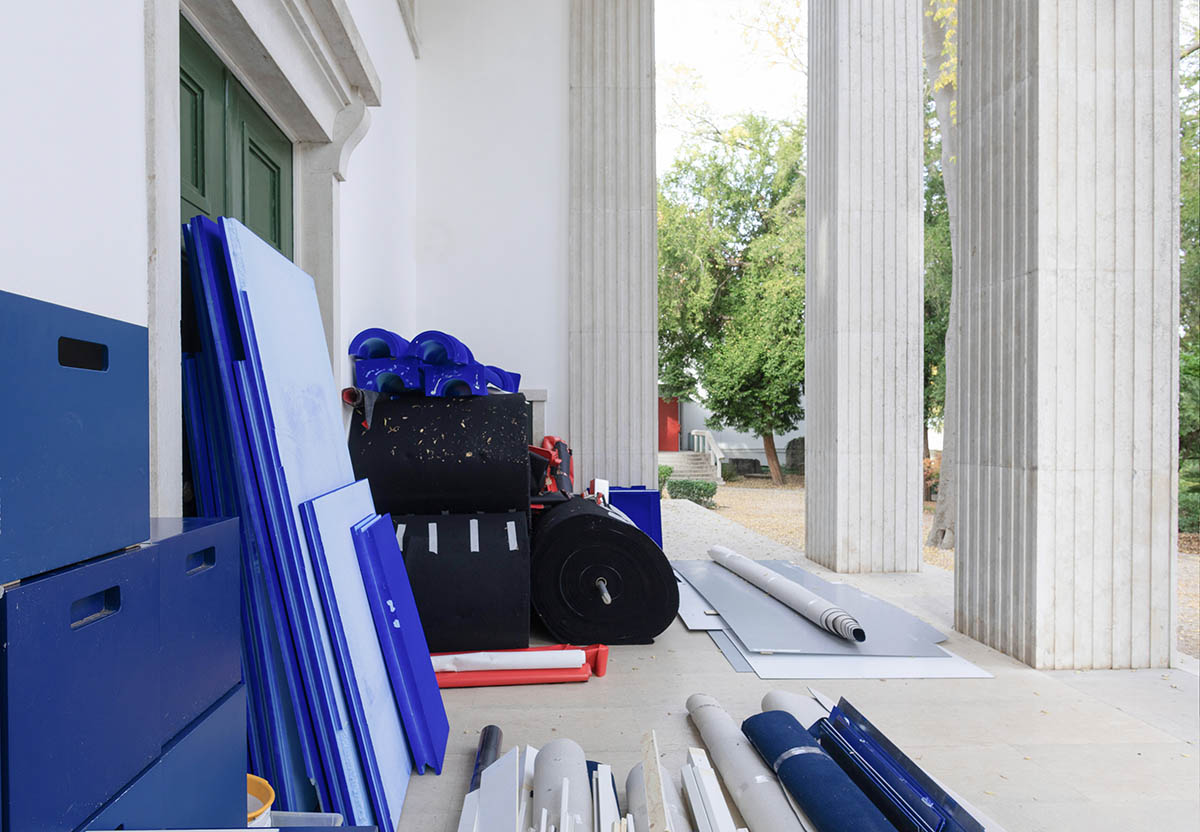
The German Pavilion will investigate resource conservation and ecological sustainability in its exhibition at the 18th International Architecture Exhibition in Venice Architecture Biennale 2023.
The exhibition, themed as Open for Maintenance – Wegen Umbau geöffnet, is curated by ARCH+, Summacumfemmer Büro Juliane Greb. The pavilion's theme will open up a discussion on the matters of care, repair, and maintenance.
Commissioned by Commissioned by the German Federal Ministry of Housing, Urban Development, and Building, the pavilion aims to shed light on contemporary debates over existing building stock in the context of sustainability and resource conservation from a historical and social perspective.
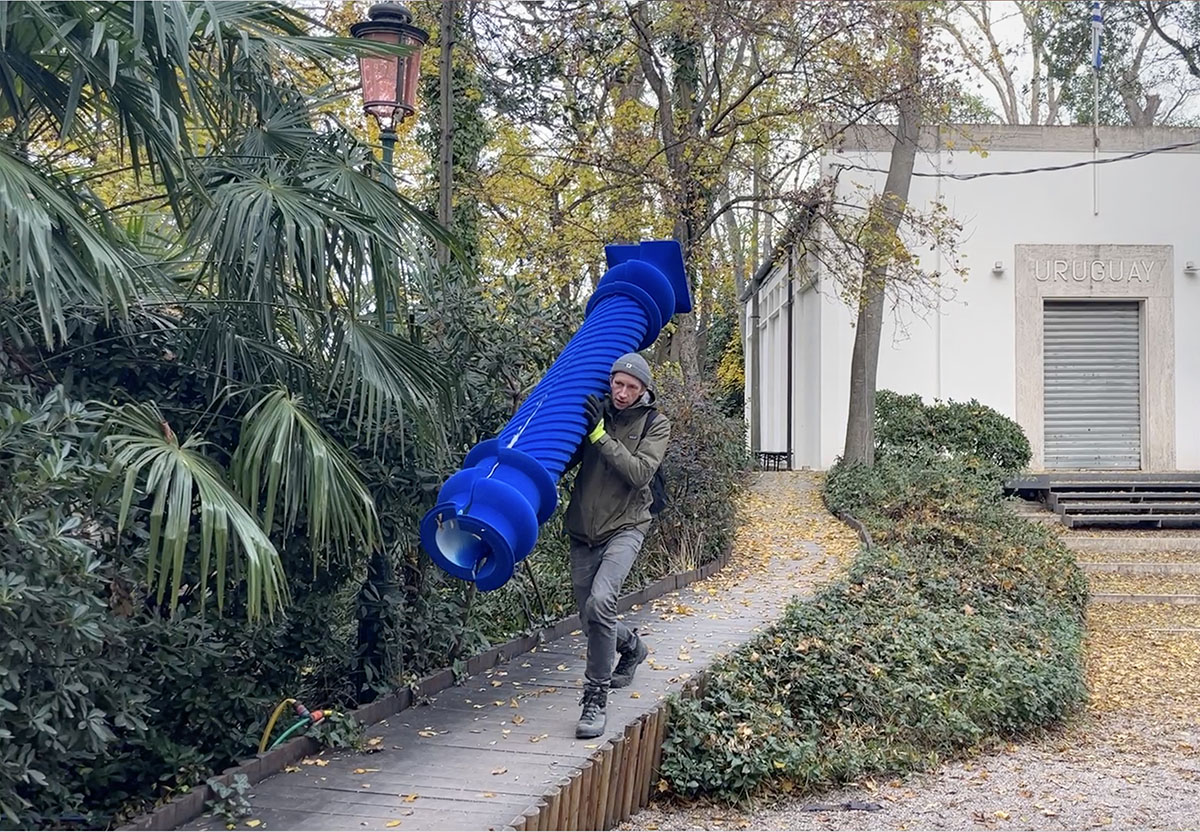
Taking over spolia from the exhibition “Queendom” at the Israeli Pavilion for the Biennale Arte 2022. Image © ARCH+, SUMMACUMFEMMER, BUERO JULIANE GREB
Derived from the squatters’ movement between 1970s and 1980s, the pavilion evaluates the concept of social practice of maintaining urban fabric in Berlin.
According to the curators, in those years itthis movement has made an important contribution toward developing a more cautious approach to urban renewal, and thus to the conservation of urban communities and built environments. The curatorial team recognizes this precedent since it demonstrates ecological sustainability that is inextricably linked to the social question.
Through the exhibition, the curators aim to implement the same squatting and maintaining principles to the German Pavilion. To achieve this, rather than dismantling Maria Eichhorn’s work "Relocating a Structure", the curators will incorporate Germany’s contribution to the Venice Art Biennale 2022 into the Pavilion’s new design.
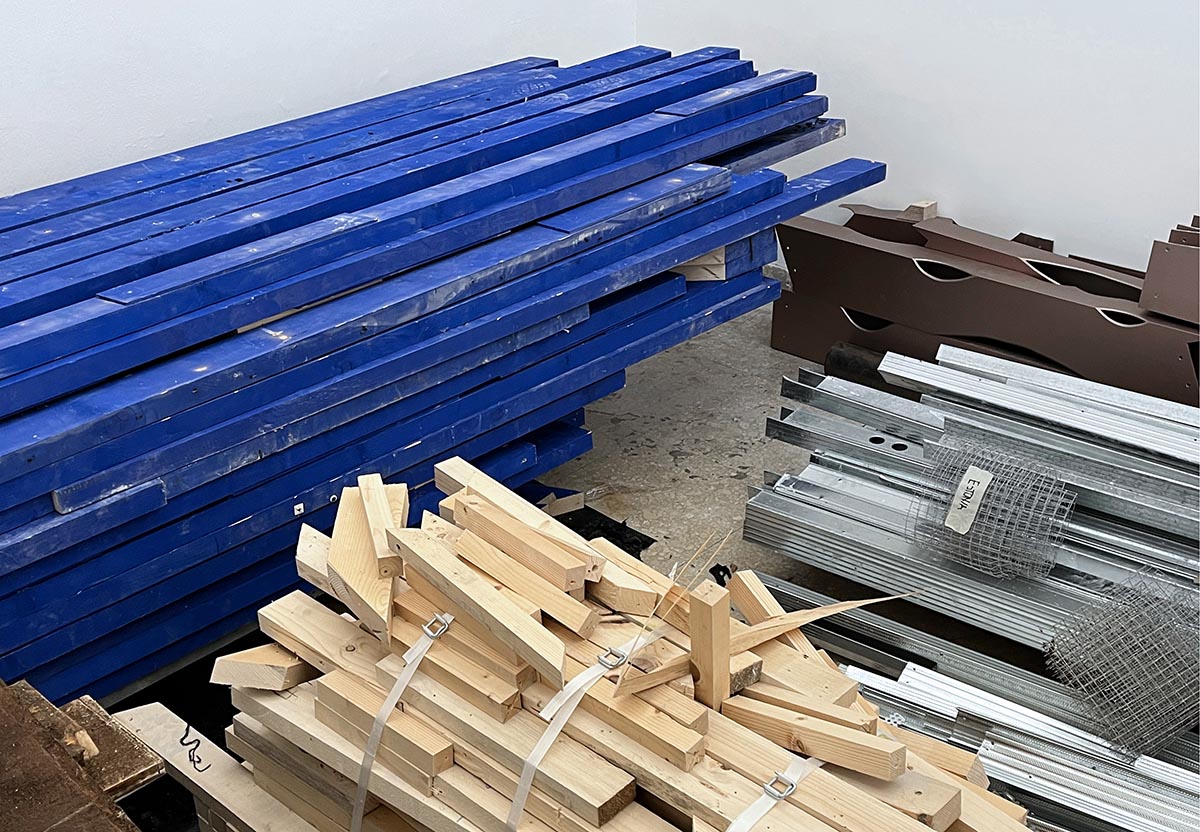
Interim storage of material leftovers from the Biennale Arte 2022 at the German Pavilion, December 2022. Image © ARCH+, SUMMACUMFEMMER, BUERO JULIANE GREB
By working with the Pavilion “as found,” the concept emphasizes the discursive, material, and economic aspects of sustainability. By doing so, the previous Venice Art Biennale and Architecture Biennale will spatially and programmatically be interwoven for the first time.
Applying the same guiding principles across the entire project, the exhibition itself will be realized entirely with leftover material from last year’s Biennale.
"A large number of national pavilions are lending support, making demolition material from their exhibitions available for reuse," said the curators.
"This integration of “spolia” from the Biennale Arte 2022 as part of a new material assemblage creates surprising new contexts of meaning and imparts unique cultural and creative value to the leftover materials."
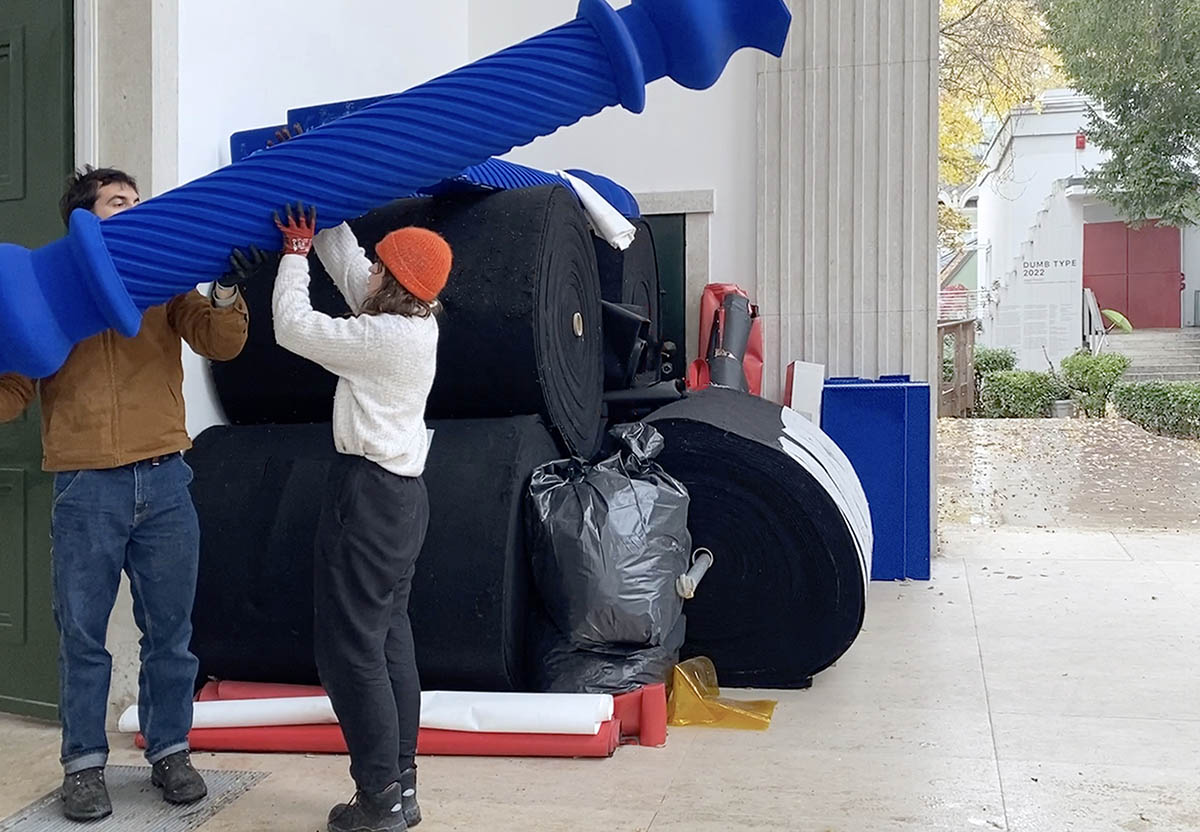
Storage of collected spolia from the Biennale Arte 2022 at the German Pavilion, December 2022. Image © ARCH+, SUMMACUMFEMMER, BUERO JULIANE GREB
The curators said that "Open for Maintenance thus takes a creative angle toward the resource problem presented by biennales, which leave behind hundreds of tons of trash every year."
"The contribution’s practice-oriented approach opens up exciting modes of action and alternative design possibilities for architecture, contributing to its social renewal," the team continued.
In response to Lesley Lokko's theme, The Laboratory of the Future, the German contribution understands the concept of the a “laboratory” in a multifaceted way—including as a workshop in the literal sense. The exhibition is inspired by Venetian urban activist Marco Baravalle’s slogan “From Exhibition to Habitation”.
The project transforms a site of national representation into a place of communal every day practice. To accomplish this, all built interventions undertaken for the Pavilion are oriented toward local needs.
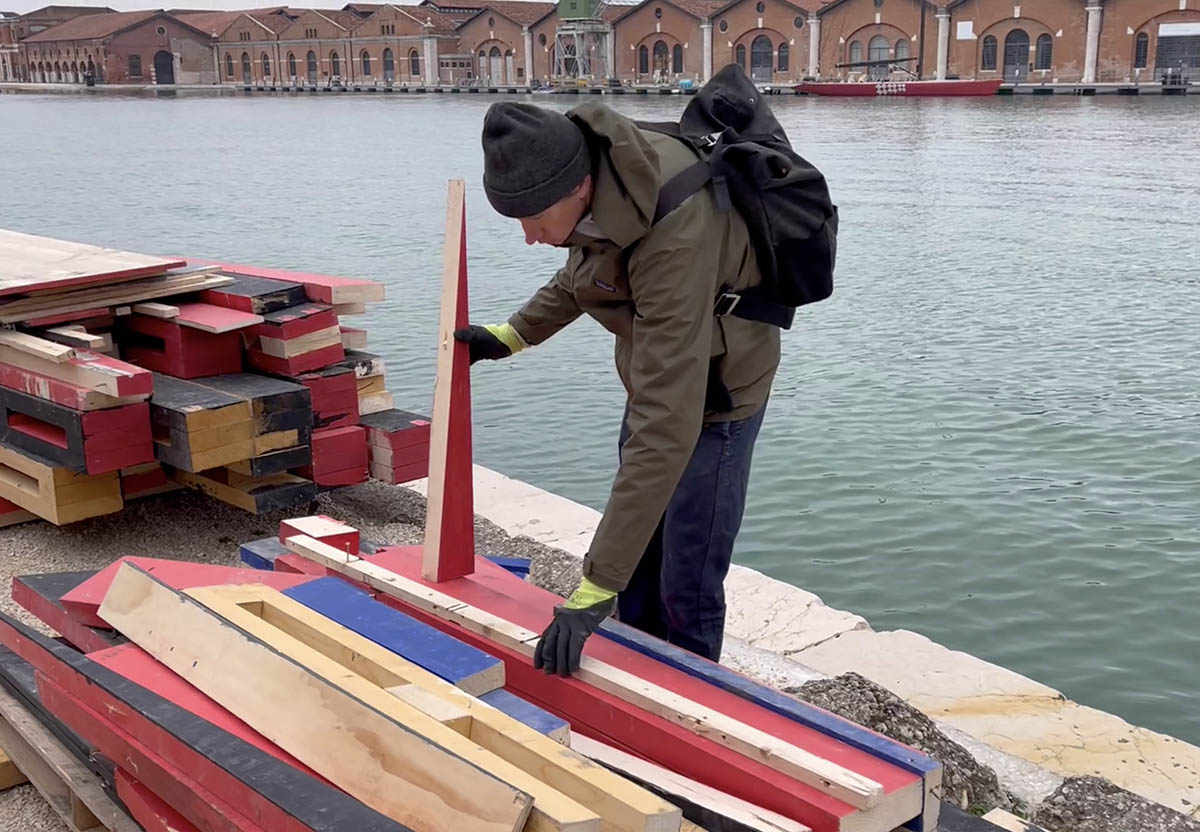
Material remnants of the Chilean Pavilion at the Biennale Arte 2022 on the grounds of the Arsenale, December 2022. Image © ARCH+, SUMMACUMFEMMER, BUERO JULIANE GREB
The curatorial team intends to turn the German Pavilion into "a productive infrastructure", promoting principles of circular construction in tandem with architecture’s social responsibility. The pavilion will serve to collect, catalog, provision, and process used material from the Venice Art Biennale 2022.
The pavilion will also host an on-site workshop for various activist groups from Venice and beyond, as well as for universities to engage, through one-on-one interventions, with the maintenance of socio-spatial structures.
In addition to the question of resources, Open for Maintenance deals with questions of social and spatial inclusion in Venice. The curatorial team stated that "hundreds of the city’s public housing units stand empty or in disrepair, while many inhabitants of the lagoon city can no longer afford to live there."
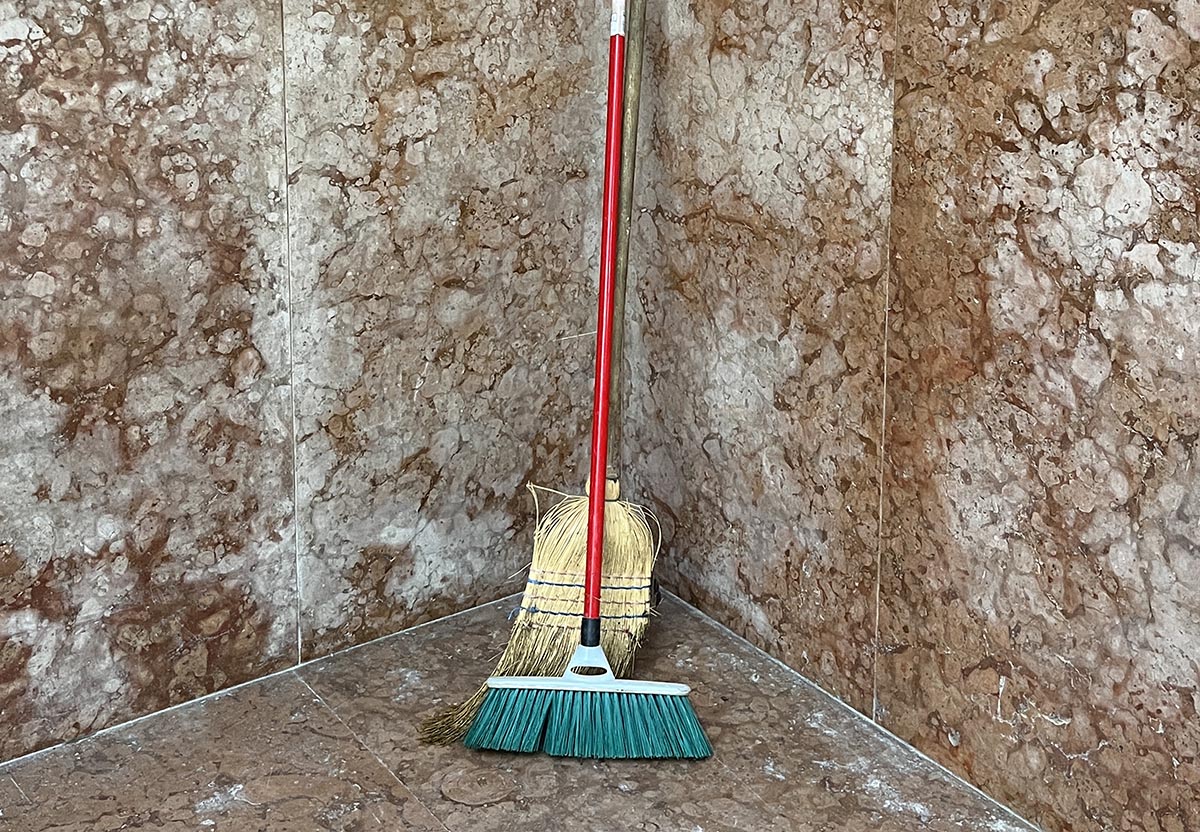
Cleaning supplies in a corner of the Czech and Slovak Pavilion, December 2022. Image © ARCH+, SUMMACUMFEMMER, BUERO JULIANE GREB
"Because of the commercialization of urban space through mass tourism, biennales, and the events industry, everyday life is disappearing, and with it go networks of social and material maintenance oriented toward the common welfare."
"At the same time, this very circumstance has resulted in a variety of activist groups taking practical approaches to solving the problem," the team added.
Reuse and circularity will be at the center of the pavilion
The exhibition offers these actors a platform: for the entire duration of this year’s Biennale Architettura, they will have the opportunity to engage critically with the format of the Biennale and with architecture as a discipline through a series of workshops featuring interventions within the Pavilion as well as the urban space of Venice.
The workshop program, titled Maintenance 1:1, will be implemented in cooperation with StoStiftung and AITDialog as part of the series Venice Biennale Lab, hosting universities, vocational schools, and initiatives from Venice and beyond.
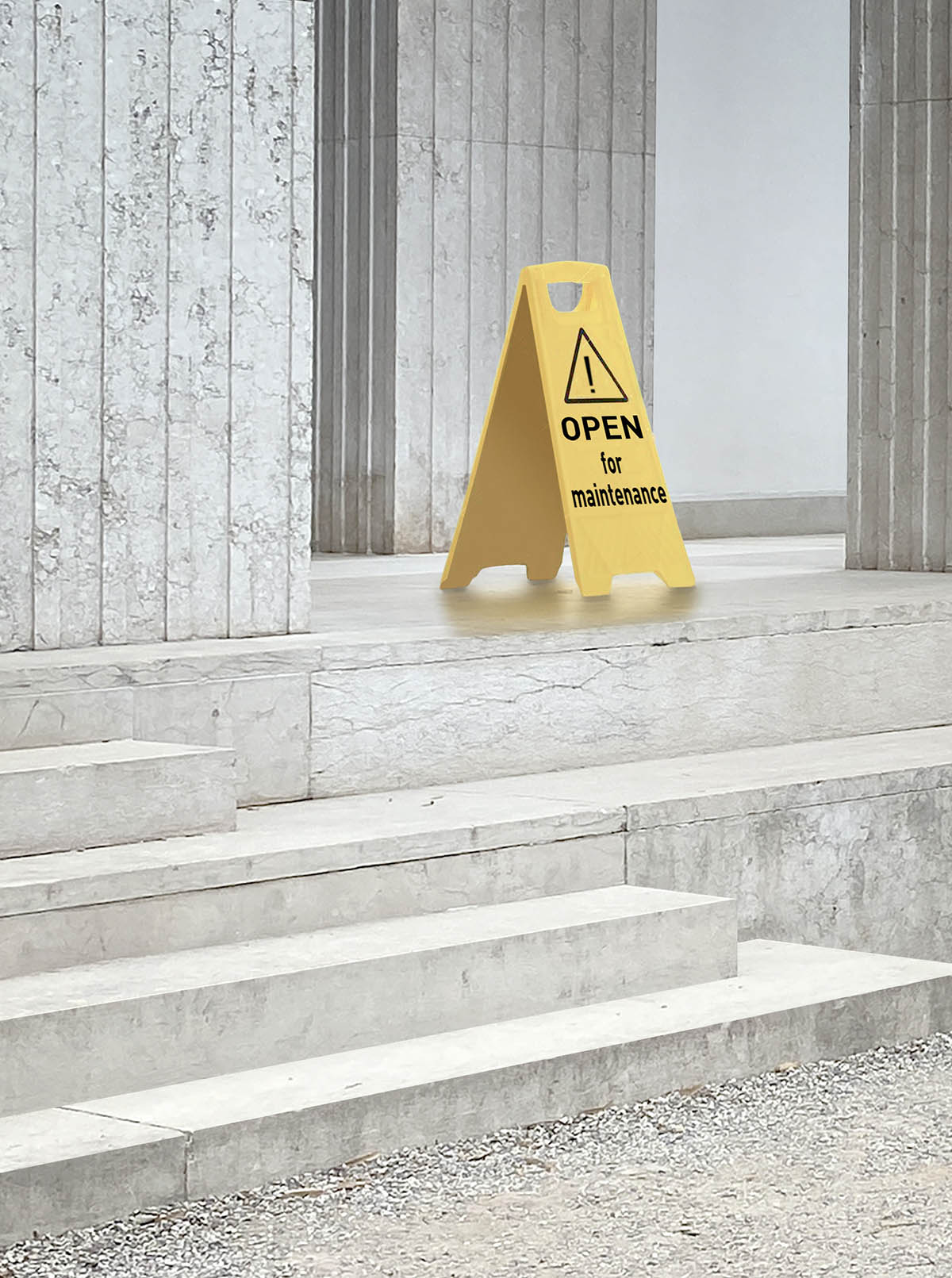
Venice Architecture Biennale 2023, Open For Maintenance. Image © ARCH+, SUMMACUMFEMMER, BUERO, JULIANE GREB
Throughout the course of the Venice Architecture Biennale 2023, the Goethe-Institut will act as the German Pavilion’s programming partner, addressing further aspects of the curatorial concept through its program series, called Performing Architecture, which will feature artistic and performative projects on topics such as inclusion, care work, and urban practice.
Adhering to the principles of reuse and circularity, the German Pavilion will investigate resource-efficient but labor-intensive efforts.
"The jury was surprised by the originality of the concept, emphasizing repair and a work- shop character which also involves collecting physical leftovers from the Biennale Arte 2022. In the midst of such improvised, unpredictable surroundings, exemplary projects will be shown and initiatives will be offered a platform," said Peter Cachola Schmal, Director of the German Architecture Museum, chairman of the selection jury for the German Pavilion 2023.
"The jury expects these strategies to make innovative use of the German Pavilion while offering a transformative approach to the Biennale as a whole, especially by incorporating and networking specific groups within Venetian civil society," Schmal added.
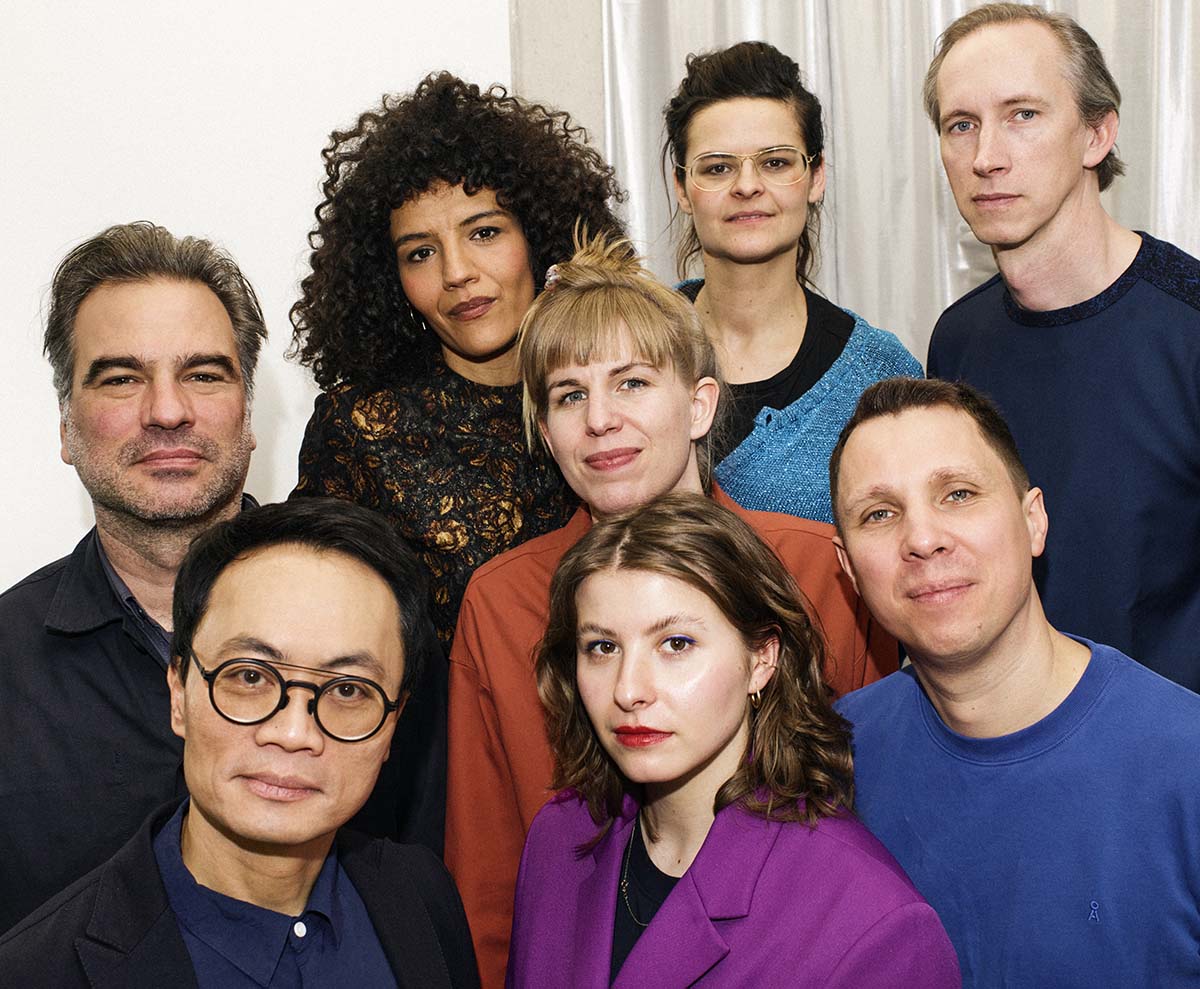
The Curatorial team (from left to right, top to bottom): Christian Hiller, Melissa Makele, Anne Femmer, Petter Krag, Juliane Greb, Anh-Linh Ngo, Franziska Gödicke, Florian Summa. Photo © Jelka von Langen
"In its contribution for the German Pavilion at the 18th International Architecture Exhibition—La Biennale di Venezia, the curatorial team around ARCH+ focuses on transforming the building sector in light of the social, political, and economic challenges we are facing today. Transformation and sustainability, in an overarching sense, are extremely relevant topics, especially in the building industry," said Parliamentary State Secretary and MP Cansel Kiziltepe, Federal Ministry for Housing, Urban Development and Building.
"This urgency is reflected in the intensive cooperation of so many exhibiting nations and local initiatives in Venice."
"I am thrilled that the 2023 German Pavilion will be presenting exciting approach- es to solutions for the complex issues surrounding responsible, climate and resource-preserving planning and building for our global society," Kiziltepe added.
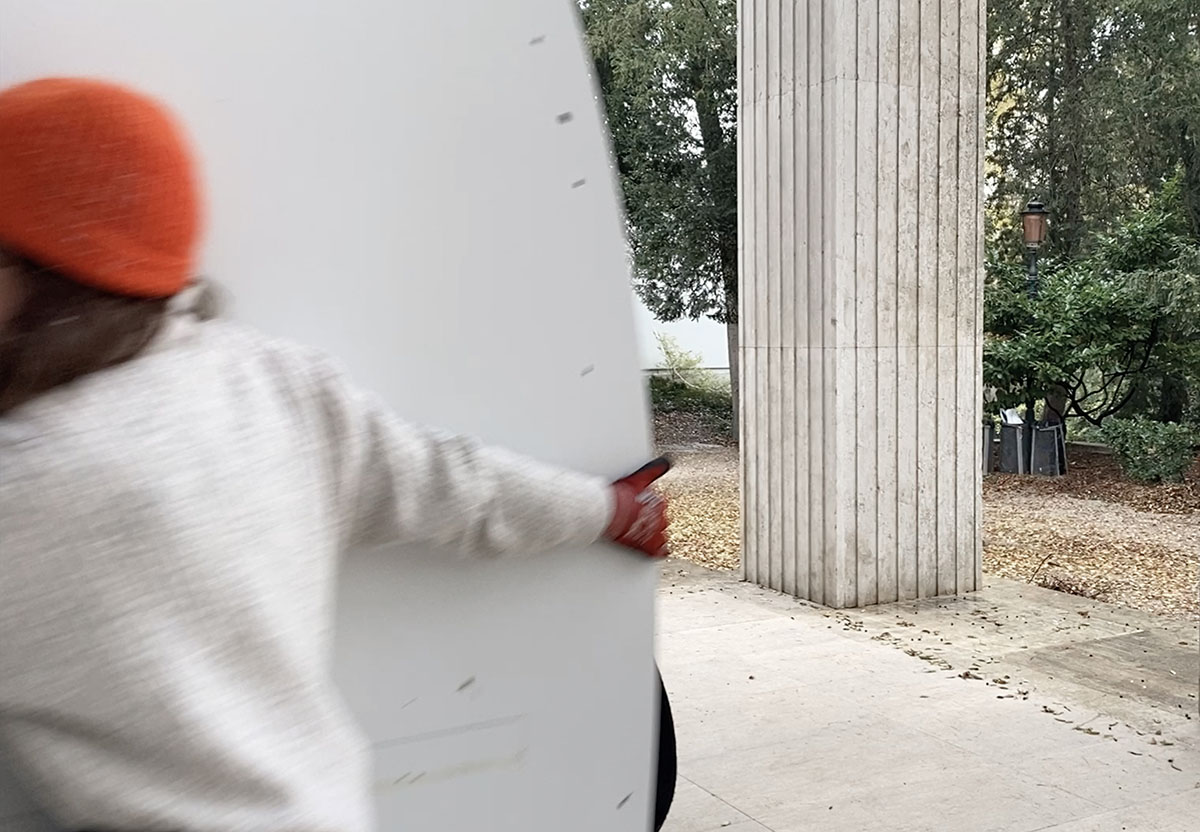
Transport of collected leftover material from the Biennale Arte 2022 to the German Pavilion, December 2022. Image © ARCH+, SUMMACUMFEMMER, BÜRO JULIANE GREB
Cuatorial team consists of: ARCH+, Summacumfemmer Büro Juliane Greb / Anne Femmer, Franziska Gödicke, Juliane Greb, Christian Hiller, Petter Krag, Melissa Makele, AnhLinh Ngo, Florian Summa.
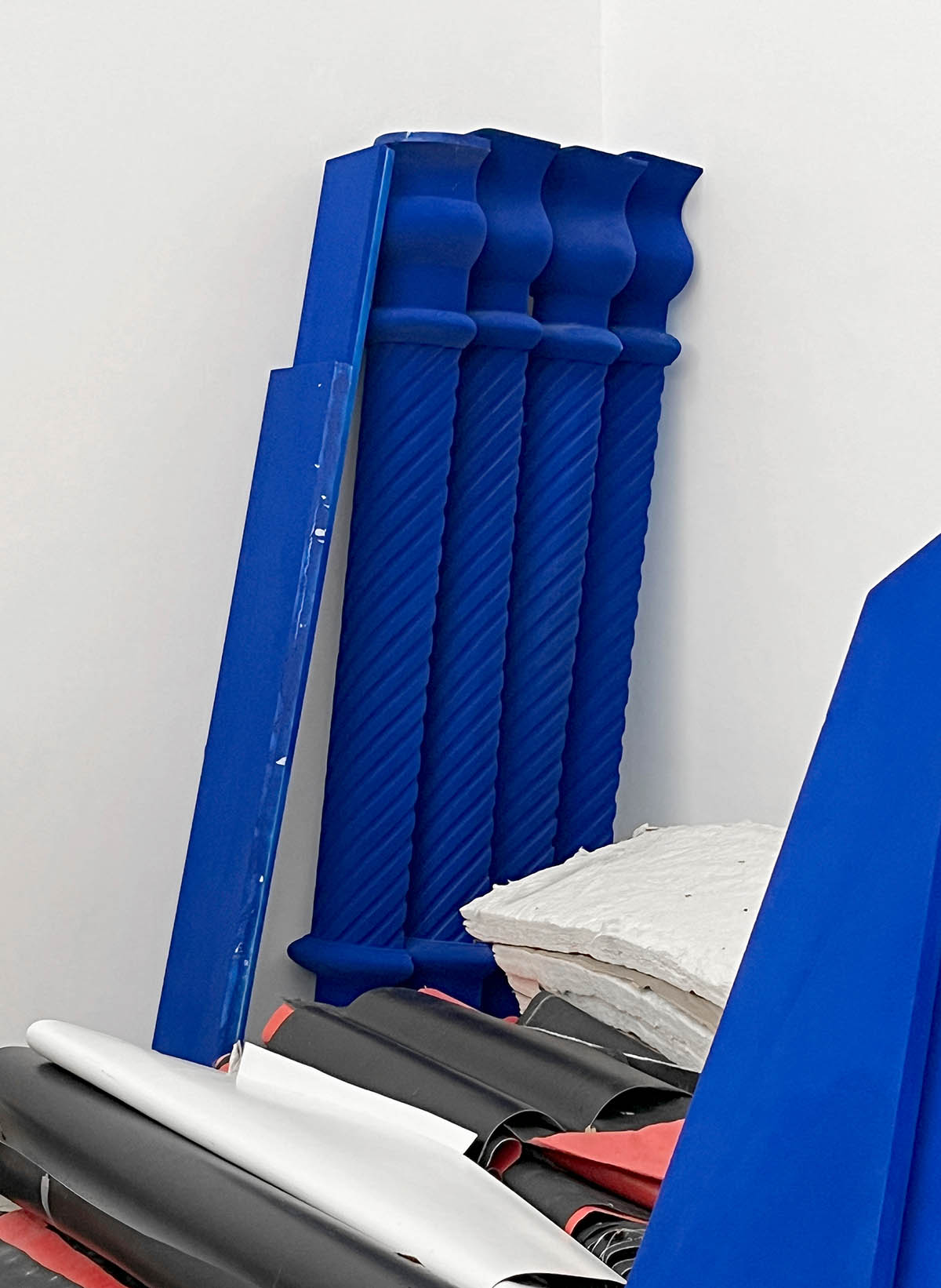
Spolia of the exhibition "Queendom" of the Israel Pavilion at the Biennale Arte 2022 and other leftover material in the German Pavilion, December 2022. Image © ARCH+, SUMMACUMFEMMER, BÜRO JULIANE GREB
The Venice Architecture Biennale 2023 will take place from Saturday 20 May to Sunday 26 November, 2023 at the Arsenale and Giardini venues.
The theme of the 18th Venice Architecture Biennale is The Laboratory of the Future curated by Lesley Lokko.
Read more about WAC's coverage about pavilions on Venice Architecture Biennale 2023.
Top image: Material fragments of the Biennale Arte 2022, temporarily stored in the portico of the German Pavilion, December 2022. Image © ARCH+, SUMMACUMFEMMER, BUERO JULIANE GREB.
> via German Pavilion
circular construction exhibition pavilion Venice Architecture Biennale
